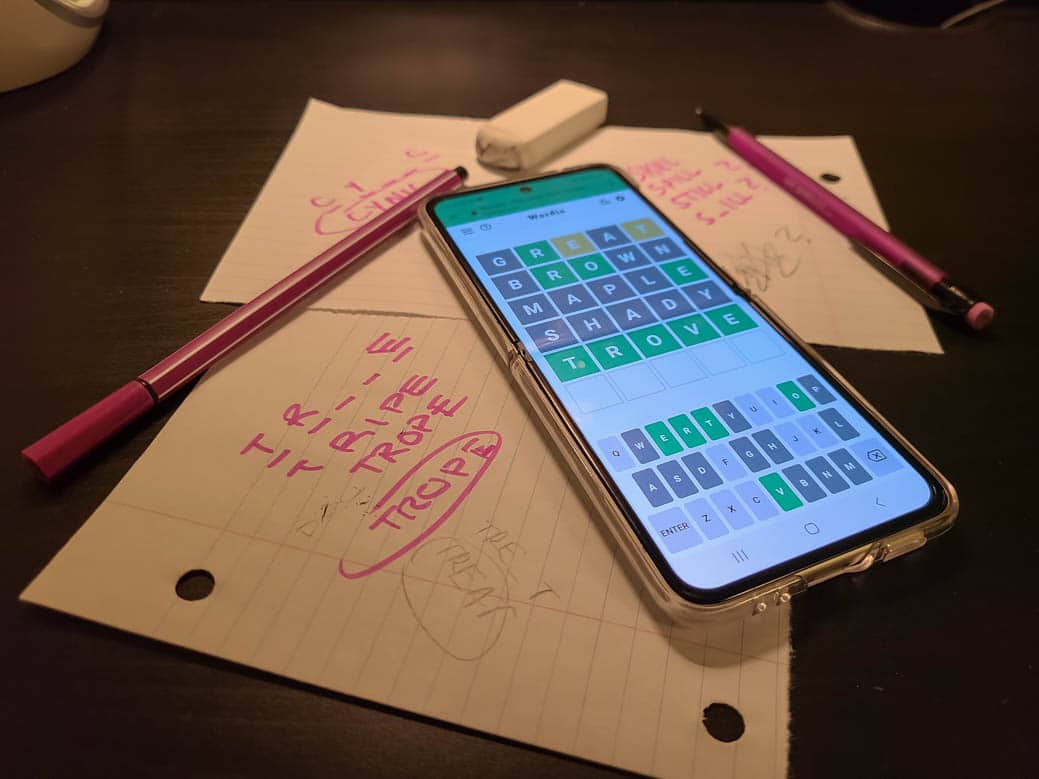Oh, for Wordles sake!
The recent purchase of the game has dissatisfied consumers due to increasing difficulty, random individualised words, and the possibility of a paywall.
Hi, my name is Serena, and I am an addict. A wordle addict.
I have always been fond of word games, particularly crossword puzzles, unscramblers, and riddles. A few weeks ago, I was bored at work when a co-worker had the idea to play a game.
“What shall we play?” I asked.
“Have you heard of Wordle?” he replied.
Neither myself nor my other colleagues had heard of the game, but we were intrigued. We pulled up the Wordle puzzle, gathered the tenants of the game, and fled to our computers to try and beat the puzzle of the day.
I felt like a word hacker trying to guess words with varying vowels and consonants. A yellow letter indicated that I was on the right track. A green letter indicated one step closer to success.
I was down to the fifth and final attempt. “T, blank, blank, S, E”. Frowning in contemplation, my mind explored the repertoire of all the words I had ever learnt, as if scanning a thesaurus. I squinted my eyes, cracked my knuckles, then typed: “T, H, O, S, E.” Every letter came up green. Bingo! I solved my first word.
I chided my co-workers with my victory while I watched them scratch their heads and scramble through their own inner thesaurus’. I didn’t give them any clues, that would be unfair. When one solved the word, we rejoiced. Those who didn’t slapped their knees and let out a big “OH!” when we told them what the word was.
The issue was that it could only be played once a day. My insatiable desire to solve another Wordle kept growing and I didn’t want to have to wait a whole day to play.
I decided to search for a way to play more than once. A quick google search revealed the jackpot I was looking for—an archive of all the past Wordles, free to play. When I went into work, I told all my colleagues. To keep busy during the slow periods, we competed with one another to solve Wordles. As corny as it may sound, Wordle brought us closer together, and now we look forward to secretly playing at work (don’t tell our managers!).
A few weeks ago, Wordle was sold to the New York Times, supposedly for a staggering seven figures. The Wordle web address has now shifted to one run by the newspaper, but that isn’t all that has changed. The transaction has caused an uproar in the Wordle community, with commentators like Trevor Noah tweeting about how Wordle just isn’t as fun anymore. Some criticized the game as being more challenging than before, with words like “Agora” and “Swill” that aren’t as commonly used amongst the everyday folk.
Another change that was brought on by the purchase was the random, individual assignment of the daily puzzle. Instead of one universal daily puzzle, the word changes for each user. Because Wordle users have established a sort of online community, this modification has incited negative reactions because of the divisiveness it causes.
Players like myself have embodied this sense of community and closeness, which I think is the point (or was the point) of the game. People enjoyed competing against one another to solve the word of the day and compare each other’s train of thoughts. To solve a word engenders a small sense of gratification, and this gratification may be diminished now that we aren’t all competing to solve the same word.
I asked a co-worker what he thought about the decision to randomize the daily puzzle. To no surprise, he commented on the communal aspect of the game. “The point of the game is to share the final results with each other and talk about how you got to that answer. That’s what makes it fun. If it was a different word for everyone, then it wouldn’t matter,” he says.
The worst part of the take-over may be the threat of another fun thing falling into the hands of capitalism—charging users to play. While the game continues to be free, who knows what the future holds for Wordle?
For now, I will be ravaging through the Wordle archives and counting down the minutes until the next daily puzzle. Let’s hope that Wordle remains universal and accessible, free from the shackles of capitalism, for Wordle’s sake!
Staff Writer (Volume 48) — Serena is a third year Art History and Professional Writing and Communications student at UTM. As a creative, she's always been fond of viewing and creating art, and writing poetry. If she isn't typing away at her desk, you can find her at an art gallery or museum, crushing an exercise, dancing to her heart's content, or cheffing-it-up in the kitchen.


